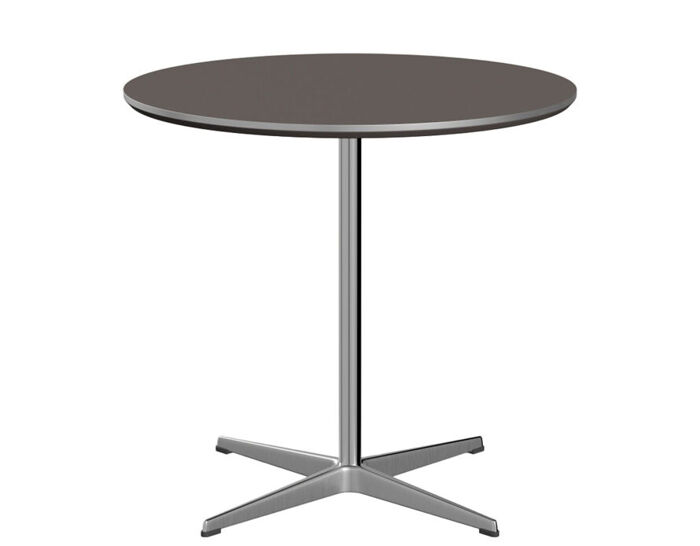small pedestal base circular table
by Arne Jacobsen from Fritz Hansen - sale
small pedestal base circular table
Design Piet Hein, Bruno Mathsson & Arne Jacobsen, 1968
Steel, synthetic material, wood veneer
Made by Fritz Hansen
"Consolation Grook: Losing one glove is certainly painful, but nothing compared to the pain of losing one, throwing away the other, and finding the first one again." - Piet Hein
The Table Series was designed by Danish poet, scientist, mathematician, and designer, Piet Hein, with contributions to the base design by Bruno Mathsson and Arne Jacobsen. This collection of tables comes in many variations of material, shapes and sizes, making it ideal for a variety of spaces including the home. This series includes the superellipse, supercircular, circular, square and rectangular tables. The bases may be span legs, shaker base, 4 or 6-star pedestal. The top is a laminated synthetic material with aluminum edge detail or walnut veneer with a matching edge, both consist of laminated chipboard with bevelled edge profiles. Base is available in your choice of powder-coated finish or chrome.
Harmonic forming in mathematics: The Superellipse. Parallel to his poetic work, Piet Hein decided to find an absolutely harmonic physical design. With mathematical intuition he first found the form and then explained it afterwards. His superellipse was to solve the double contrast between the circle and the square and that of the ellipse and the rectangle. By means of mathematics he found a harmonic geometrical figure which was first used on a large scale in connection with the solution to a town planning problem in Stockholm. In a rectangular square, 200 metres long, in Stockholm's centre two motorways were to meet in a gigantic roundabout. The solution was the application of the superellipse to both square and roundabout at the new Sergels Torg. Later on the superellipse has been used in Canada, France, Japan, the US and Mexico in connection with the solution of as different constructions as residential areas and sports centers for example the Olympic Stadium in Mexico City. Within furniture design the superellipse also became the solution to various problems - especially in relation to Piet Hein's design of tabletops the superellipse became popular.
* Circular top, small diameter
* 3 heights available (coffee, dining, bar)
18.5" h | 29.5" dia. (coffee table height)
28.3" h | 29.5" dia. (dining height)
42.5" h | 29.5" dia. (bar height)
Steel, synthetic material, wood veneer
Made by Fritz Hansen
"Consolation Grook: Losing one glove is certainly painful, but nothing compared to the pain of losing one, throwing away the other, and finding the first one again." - Piet Hein
The Table Series was designed by Danish poet, scientist, mathematician, and designer, Piet Hein, with contributions to the base design by Bruno Mathsson and Arne Jacobsen. This collection of tables comes in many variations of material, shapes and sizes, making it ideal for a variety of spaces including the home. This series includes the superellipse, supercircular, circular, square and rectangular tables. The bases may be span legs, shaker base, 4 or 6-star pedestal. The top is a laminated synthetic material with aluminum edge detail or walnut veneer with a matching edge, both consist of laminated chipboard with bevelled edge profiles. Base is available in your choice of powder-coated finish or chrome.
Harmonic forming in mathematics: The Superellipse. Parallel to his poetic work, Piet Hein decided to find an absolutely harmonic physical design. With mathematical intuition he first found the form and then explained it afterwards. His superellipse was to solve the double contrast between the circle and the square and that of the ellipse and the rectangle. By means of mathematics he found a harmonic geometrical figure which was first used on a large scale in connection with the solution to a town planning problem in Stockholm. In a rectangular square, 200 metres long, in Stockholm's centre two motorways were to meet in a gigantic roundabout. The solution was the application of the superellipse to both square and roundabout at the new Sergels Torg. Later on the superellipse has been used in Canada, France, Japan, the US and Mexico in connection with the solution of as different constructions as residential areas and sports centers for example the Olympic Stadium in Mexico City. Within furniture design the superellipse also became the solution to various problems - especially in relation to Piet Hein's design of tabletops the superellipse became popular.
* Circular top, small diameter
* 3 heights available (coffee, dining, bar)
18.5" h | 29.5" dia. (coffee table height)
28.3" h | 29.5" dia. (dining height)
42.5" h | 29.5" dia. (bar height)
Arne Jacobsen
Arne Jacobsen is remembered for architectural functionalism and famous chair designs. 1929 he won a Danish Architect's Association competition for designing the 'House of the Future' and was recognized as an ultra-modern architect.
Fritz Hansen is characterized by premium quality Danish Modern design. Iconic designers Arne Jacobsen & Poul Kjaerholm created beautifully shaped furniture, innovative techniques and new materials.








 write a review now
write a review now
